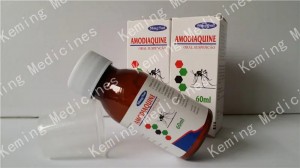Amodiaquine Hydrochloride Dry Syrup is an antimalarial medication that exerts its pharmacological effects through various mechanisms. This innovative formulation offers a potent and effective treatment option for malaria, a mosquito-borne infectious disease.
The primary pharmacological action of Amodiaquine Hydrochloride Dry Syrup is the inhibition of the Plasmodium parasite, the causative agent of malaria. It belongs to the 4-aminoquinoline class of antimalarial drugs and works by interfering with the parasite’s ability to digest hemoglobin, a process crucial for its survival within the host’s red blood cells.
Amodiaquine Hydrochloride Dry Syrup exerts its antimalarial activity by preventing the detoxification of toxic heme, a byproduct of hemoglobin breakdown, within the parasite. This accumulation of toxic heme leads to the disruption of essential cellular processes, ultimately causing the death of the Plasmodium parasite.
Furthermore, Amodiaquine Hydrochloride Dry Syrup demonstrates blood schizonticidal activity, meaning it is effective against the blood stages of the parasite’s life cycle. This property is important in the treatment of uncomplicated malaria, as it directly targets the replicating forms of the parasite in the bloodstream.
In addition to its schizonticidal activity, Amodiaquine Hydrochloride Dry Syrup possesses gametocytocidal properties. This means it can eliminate the sexual forms of the parasite, called gametocytes, which are responsible for transmitting the infection to mosquitoes and perpetuating the malaria life cycle. By targeting gametocytes, Amodiaquine Hydrochloride Dry Syrup helps reduce the overall transmission of malaria within communities.
The pharmacokinetic profile of Amodiaquine Hydrochloride Dry Syrup is characterized by good oral absorption, rapid distribution, and extensive metabolism in the liver. The drug undergoes hepatic metabolism via the cytochrome P450 system, primarily CYP2C8 and CYP3A4 enzymes, resulting in the formation of active metabolites responsible for its antimalarial activity.
It is worth noting that the efficacy of Amodiaquine Hydrochloride Dry Syrup may vary depending on the geographical location due to the presence of drug-resistant Plasmodium strains. In areas with known resistance, Amodiaquine Hydrochloride Dry Syrup is often used in combination with other antimalarial agents to ensure optimal treatment outcomes.
Overall, the pharmacological properties of Amodiaquine Hydrochloride Dry Syrup make it a valuable addition to the armamentarium against malaria. Its ability to target multiple stages of the parasite’s life cycle, combined with its favorable pharmacokinetics, contributes to its effectiveness in treating and preventing malaria infections.
Post time: May-17-2023





